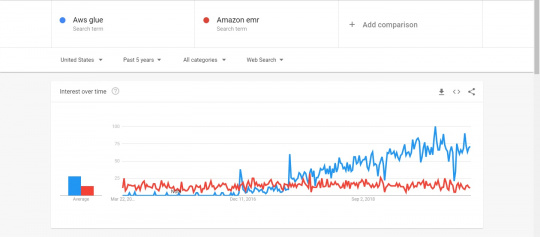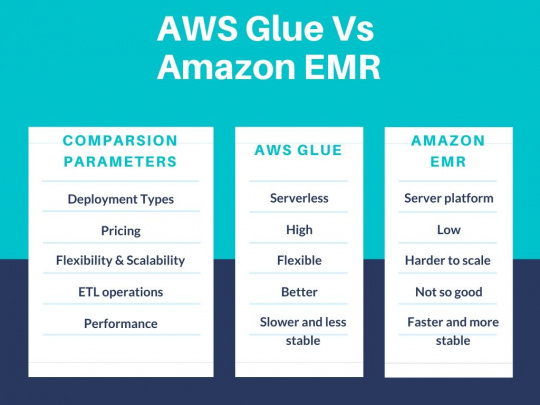Companies are leaning towards big data and cloud computing platforms in this digital business economy. And Amazon is leading the big data and the cloud computing markets with AWS.
We will be looking at some of the key differences that distinguish AWS Glue from Amazon EMR through this blog. But before going into the differentiating parameters, let us understand how these platforms work.
AWS Glue Vs. Amazon EMR
AWS Glue is an ETL (Extract, Transform, and Load) tool that assists the users to create and load the data. This data can readily be used for analytics purposes. It can easily transform the complicated and huge volumes of data.
It comes with an AWS console that allows you to easily extract the data and transform it into the form you require. You can also easily prepare the transformed data for analytical purposes with few clicks.
Amazon EMR is a cloud-based big data platform. It is known for its speed and ease of data conversions. The converted data is later used for big data analytics purposes.
It is customizable, and it can run for both short and long instances. It is easy to deploy if you already have a setup for big data.
AWS Glue Vs. Amazon EMR: Which One is Popular?

From the above-mentioned graph, we can see that AWS Glue is more popular than Amazon EMR in terms of google search over a period of 5 years.
AWS Glue Vs. Amazon EMR: Deployment Types
AWS Glue is a serverless platform. So, you don't need to worry about setting up the server or investing in the necessary infrastructure.
But, on the other hand, Amazon EMR requires you to have the necessary infrastructure for big data operations. If you have the infrastructure, it is simple to deploy.
AWS Glue Vs. Amazon EMR: Pricing
Since AWS Glue comes as a serverless platform, it has more cost attached to it. But, on the other hand, Amazon EMR is less costly as you already have the required setup.
Typically, AWS Glue costs you around $0.44 per hour per DPU. So roughly, you would need to pay around $21 per day.
But on the other hand, Amazon EMR is less costly. You have to pay around $14-16 per day for similar configurations.
Also Read: AWS Lambda vs. Azure Functions: Performance, Pricing & More Compared
AWS Glue Vs. Amazon EMR: Flexibility & Scalability
AWS Glue is a flexible and easily scalable ETL platform as it works on AWS serverless platform. But, on the other hand, Amazon EMR is less flexible as it works on your onsite platform.
So, in short, if you have flexible requirements, and you need to scale up and down, AWS Glue is a more viable option. But, if you have fixed requirements and you have the setup, it is better to opt for Amazon EMR.
AWS Glue Vs. Amazon EMR: ETL Operations
AWS Glue is designed to operate the Extract, Transform, and Load operations for big data analytics. Amazon EMR can also be used for ETL operations, amongst many other database operations.
But, AWS Glue is faster than Amazon EMR being an ETL-only platform. As a serverless platform, AWS Glue has the edge over EMR in terms of operational flexibility.
So if you want to use either one of these tools for ETL operations only, I would suggest you go for Amazon Glue from operational perspectives.
AWS Glue Vs. Amazon EMR: Performance
In AWS Glue, you cannot store temp files, executable files on your end due to serverless infrastructure. This, in turn, affects the performance of the system.
But, on the other hand, if you're using Amazon EMR, you can store these files on your end. This allows you to run the database faster and enhances the overall system performance.
When comparing AWS Glue and Amazon EMR from performance parameters, Amazon EMR is a faster platform.

Key Takeaways:
As seen earlier, AWS Glue is quite useful when your requirements are flexible. As an ETL only platform, you can have operational flexibility with this tool.
While on the other hand, Amazon EMR is more suited when you have the entire necessary infrastructure available. It is a lot cheaper than its counterpart. It is also a faster platform than AWS Glue.
Both of these platforms are good and serve their purpose in an effective way. Ultimately, it depends upon your requirements to see which one fits better for your purpose.
 From the above-mentioned graph, we can see that AWS Glue is more popular than Amazon EMR in terms of google search over a period of 5 years.
AWS Glue is a serverless platform. So, you don't need to worry about setting up the server or investing in the necessary infrastructure.
But, on the other hand, Amazon EMR requires you to have the necessary infrastructure for big data operations. If you have the infrastructure, it is simple to deploy.
Since AWS Glue comes as a serverless platform, it has more cost attached to it. But, on the other hand, Amazon EMR is less costly as you already have the required setup.
Typically, AWS Glue costs you around $0.44 per hour per DPU. So roughly, you would need to pay around $21 per day.
But on the other hand, Amazon EMR is less costly. You have to pay around $14-16 per day for similar configurations.
Also Read: AWS Lambda vs. Azure Functions: Performance, Pricing & More Compared
AWS Glue is a flexible and easily scalable ETL platform as it works on AWS serverless platform. But, on the other hand, Amazon EMR is less flexible as it works on your onsite platform.
So, in short, if you have flexible requirements, and you need to scale up and down, AWS Glue is a more viable option. But, if you have fixed requirements and you have the setup, it is better to opt for Amazon EMR.
AWS Glue is designed to operate the Extract, Transform, and Load operations for big data analytics. Amazon EMR can also be used for ETL operations, amongst many other database operations.
But, AWS Glue is faster than Amazon EMR being an ETL-only platform. As a serverless platform, AWS Glue has the edge over EMR in terms of operational flexibility.
So if you want to use either one of these tools for ETL operations only, I would suggest you go for Amazon Glue from operational perspectives.
In AWS Glue, you cannot store temp files, executable files on your end due to serverless infrastructure. This, in turn, affects the performance of the system.
But, on the other hand, if you're using Amazon EMR, you can store these files on your end. This allows you to run the database faster and enhances the overall system performance.
When comparing AWS Glue and Amazon EMR from performance parameters, Amazon EMR is a faster platform.
From the above-mentioned graph, we can see that AWS Glue is more popular than Amazon EMR in terms of google search over a period of 5 years.
AWS Glue is a serverless platform. So, you don't need to worry about setting up the server or investing in the necessary infrastructure.
But, on the other hand, Amazon EMR requires you to have the necessary infrastructure for big data operations. If you have the infrastructure, it is simple to deploy.
Since AWS Glue comes as a serverless platform, it has more cost attached to it. But, on the other hand, Amazon EMR is less costly as you already have the required setup.
Typically, AWS Glue costs you around $0.44 per hour per DPU. So roughly, you would need to pay around $21 per day.
But on the other hand, Amazon EMR is less costly. You have to pay around $14-16 per day for similar configurations.
Also Read: AWS Lambda vs. Azure Functions: Performance, Pricing & More Compared
AWS Glue is a flexible and easily scalable ETL platform as it works on AWS serverless platform. But, on the other hand, Amazon EMR is less flexible as it works on your onsite platform.
So, in short, if you have flexible requirements, and you need to scale up and down, AWS Glue is a more viable option. But, if you have fixed requirements and you have the setup, it is better to opt for Amazon EMR.
AWS Glue is designed to operate the Extract, Transform, and Load operations for big data analytics. Amazon EMR can also be used for ETL operations, amongst many other database operations.
But, AWS Glue is faster than Amazon EMR being an ETL-only platform. As a serverless platform, AWS Glue has the edge over EMR in terms of operational flexibility.
So if you want to use either one of these tools for ETL operations only, I would suggest you go for Amazon Glue from operational perspectives.
In AWS Glue, you cannot store temp files, executable files on your end due to serverless infrastructure. This, in turn, affects the performance of the system.
But, on the other hand, if you're using Amazon EMR, you can store these files on your end. This allows you to run the database faster and enhances the overall system performance.
When comparing AWS Glue and Amazon EMR from performance parameters, Amazon EMR is a faster platform.




0 Comments